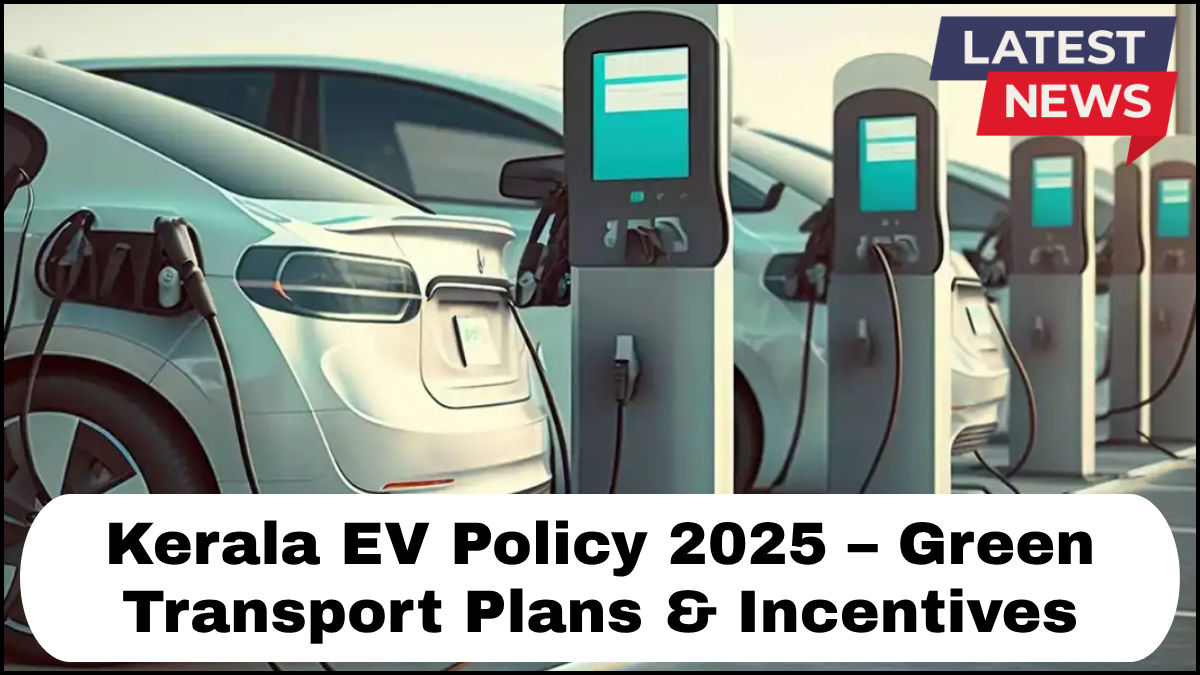Kerala is accelerating its transition to sustainable mobility with the rollout of the Kerala EV Policy 2025. The state government aims to position Kerala as a national leader in green transportation by promoting the widespread adoption of electric vehicles (EVs), investing in charging infrastructure, and offering robust incentives. This ambitious policy is not just about reducing emissions – it’s about building a cleaner, smarter, and more future-ready transport ecosystem.

Vision and Objectives of Kerala EV Policy 2025
The core vision of the Kerala EV Policy 2025 is to make 1 million EVs operational in the state by 2025. This includes:
- Electrification of public and commercial transport.
- Development of EV manufacturing and R&D hubs.
- Widespread deployment of charging stations.
- Job creation through green tech industries.
The policy aligns with Kerala’s broader climate goals and India’s national electric mobility mission. It emphasizes long-term sustainability, energy efficiency, and reducing dependency on fossil fuels.
Key Incentives Under the Policy
To encourage early adoption, the Kerala EV Policy 2025 offers a range of incentives for both consumers and manufacturers:
- Purchase Subsidies: Up to Rs. 30,000 subsidy for electric two-wheelers and Rs. 1.5 lakh for electric four-wheelers.
- Road Tax Exemption: Full exemption on road tax for all EVs registered in Kerala till 2025.
- Registration Fee Waiver: No registration charges for EV buyers.
- Retrofit Incentives: Financial support for converting existing fuel-based vehicles into electric ones.
- Fleet Transition Support: Ride-hailing services and public transport operators get special incentives for switching to EV fleets.
These measures significantly reduce the upfront cost barrier and promote mass-market adoption.
Infrastructure Push for Green Transportation
One of the pillars of the Kerala EV Policy 2025 is robust infrastructure development:
- Charging Stations: Target of 1 charging station every 25 km on highways and at all government buildings, fuel stations, and malls.
- Battery Swapping Hubs: Pilot programs in cities like Kochi and Thiruvananthapuram.
- Solar-Powered Charging Units: Emphasis on integrating renewable energy with EV infrastructure.
The government is also working with private players to create public-private partnerships that fast-track EV infrastructure development.
Focus on Public Transport Electrification
Kerala is prioritizing the electrification of public transport to reduce urban pollution:
- Electric Buses: Kerala State Road Transport Corporation (KSRTC) aims to deploy 3,000 electric buses by 2025.
- E-Auto and E-Taxi Initiatives: Programs to support low-income drivers transitioning to electric vehicles.
- Smart Transit Hubs: Integration of EV charging with bus and metro stations.
This shift is designed to make green transportation accessible and affordable for everyday commuters.
Industrial and Economic Opportunities
The policy also opens up major economic avenues:
- EV Manufacturing Clusters: Special zones in Palakkad and Kannur are being developed for EV assembly and component manufacturing.
- Skill Development: Collaboration with technical institutes for EV-focused training programs.
- Start-Up Ecosystem: Kerala Start-Up Mission (KSUM) is supporting innovations in battery tech, charging solutions, and EV software.
By fostering local industry, Kerala aims to become a hub for clean mobility technology.
Monitoring and Policy Adaptability
To ensure real-world impact, the government has set up the State Electric Vehicle Board to oversee implementation, track progress, and make timely course corrections. Data analytics and feedback from stakeholders will guide adaptive policymaking.
FAQs
Q1. What is the goal of the Kerala EV Policy 2025?
The policy aims to bring 1 million electric vehicles on Kerala roads by 2025 and build the infrastructure needed to support a transition to green transportation.
Q2. Who can benefit from the incentives under this policy?
Individual buyers, commercial fleet owners, public transport operators, and EV manufacturers can all benefit from subsidies, tax exemptions, and infrastructure support.
Q3. Is there support for converting petrol or diesel vehicles into EVs?
Yes, the policy includes incentives for retrofitting existing vehicles with electric drivetrains.
Q4. How will Kerala support EV charging infrastructure?
The state plans to build a dense network of charging stations, including fast-chargers, battery swapping centers, and solar-powered units.
Q5. How does this policy impact the environment?
By promoting EVs and reducing fossil fuel use, the policy helps cut carbon emissions, improves air quality, and supports climate resilience.
click here to learn more
